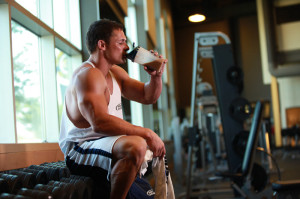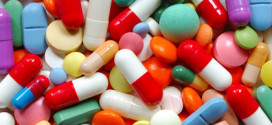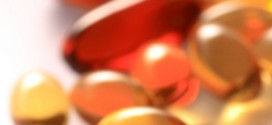Sports Researchers will tell you that what you put into your protein shake after a mammoth gym session will have a dramatic effect on the repair and regrowth of your muscles. But what exactly are the best supplements to pop into your shaker if you’re wanting to bulk up? Here we’ve teamed up with the scientists at www.theproteinworks.com to see how you can create the perfect post workout shake based on latest studies in sports nutrition in the last 5 years.
More Protein, More Muscle
 Research at the Medical Branch of the University of Texas showed that after a workout your muscles are starved and possess a ‘sponge like’ property that experts believe is responsible for your body’s ability to absorb more protein than any other time of the day (R.R. Wolfe et al, 1995.) In fact research shows your muscles can absorb almost 50% more protein than you can at a regular meal. So it makes sense to take advantage and increase your protein intake after exercise by adding 30-40 grams of a good whey protein.
Research at the Medical Branch of the University of Texas showed that after a workout your muscles are starved and possess a ‘sponge like’ property that experts believe is responsible for your body’s ability to absorb more protein than any other time of the day (R.R. Wolfe et al, 1995.) In fact research shows your muscles can absorb almost 50% more protein than you can at a regular meal. So it makes sense to take advantage and increase your protein intake after exercise by adding 30-40 grams of a good whey protein.
Muscle Building Carbohydrates
Put a large 60 gram serving of 100+ glycaemic index carbohydrates in your shake (like dextrose or maltodextrin) since research conducted at the Department of Human Biology at Maastricht University in the Netherlands, showed these dramatically boost insulin levels which in turn increases the absorption of protein, creatine and the other ingredients in your shake (Luc J. C. van Loon et al 2000).
Protein Boosting Amino
Try adding a very small tea spoon (3 grams) of the essential amino acid leucine to your shake since research conducted at the School of Sport and Exercise Sciences at the University of Birmingham showed the higher leucine levels in your bloodstream, the higher the rate of protein synthesis in your muscles (René Koopman et al, 2004.) In fact other studies show Leucine can help the absorption of every other nutrient as well as protein, so having this in your shake can help your body absorb all the other nutrients within it.
Ramp Up Recovery
Put as little as 1.5 grams of the amino acid HMB (Beta-hydroxy beta-methylbutyrate) in your shake since a study conducted at the School of Life Sciences at Kingston University in the United Kingdom, showed this greatly decreases muscle soreness after a workout (Ken A. Van Someren et al, 2005) meaning you are able to train again the next day free from aches and pains.
Time To Take Your Creatine
Creatine monohydrate has been the subject of hundreds of studies proving its role in strength, power and muscle growth. So try adding 5 grams to your post workout shake since as Sports Scientists John Ivy and Robert Portman mention in their book ‘Nutrient Timing: The Future of Sports Nutrition’ having creatine post workout with a 100+ glycaemic index carbohydrate will greatly increase its absorption.
References:
Van Someren, Ken A. , Edwards, Adam J. and Howatson, Glyn (2005) ‘Supplementation with [beta]-hydroxy-[beta]-methylbutyrate (HMB) and [alpha]-ketoisocaproic acid (KIC) reduces signs and symptoms of exercise-induced muscle damage in man.’ International Journal of Sport Nutrition & Exercise Metabolism, 15(4), pp. 413-424
John Ivy, PhD, Robert Portman, PhD (2004) ‘Nutrient Timing: The Future of Sports Nutrition.’ North Bergen, NJ: Basic Health Publications Inc.
Tipton, Kevin D, et al (1999) ‘Postexercise net protein synthesis in human muscle from orally administered amino acids.’ American Journal of Physiology – Endocrinology and Metabolism, 1999; 276: 628-634
Paddon-Jones, D., Sheffield-Moore, M., Zhang, X.J., Volpi, E., Wolf, S.E., Aarsland, A., Ferrando, A.A. & Wolfe, R.R. (2004) ‘Amino acid ingestion improves muscle protein synthesis in the young and elderly.’ Am J Physiol Endocrinol Metab., 286: E321-E328, March 2004.
Rasmussen BB, Phillips SM. (2003) ‘Contractile and nutritional regulation of human muscle growth.’ Exercise Sport Science Rev. 2003 Jul;31(3):127-31.
Rieu, Isabelle (2006) ‘Leucine supplementation improves muscle protein synthesis in elderly men independently of hyperaminoacidaemia.’ Journal of Physiology 2006; 575; 305-15.
Lemon, P.R. (1998) ‘Effects of exercise on dietary protein requirements.’ Int J Sport Nutr., 8:426-447. December 1998.
Katsanos, C.S., Kobayashi, H., Sheffield-Moore, M., Aarsland, A. & Wolfe, R.R. (2006) ‘A high proportion of leucine is required for optimal stimulation of the rate of muscle protein synthesis by essential amino acids in the elderly.’ Am J Physiol Endocrinol Metab., 291: E381-E387, February 2006.
Bohe, J., Low, J.F.A., Wolfe, R.R. & Rennie, M.J. (2001) ‘Latency and duration of stimulation of human muscle protein synthesis during continuous infusion of amino acids.’ J Physiol., 532(Pt 2): 575-579. April 2001.
Anthony, J.C., Lang, C.H., Crozier, S.J., Anthony, T.G., MacLean, D.A., Kimball, S.R. & Jefferson, L.S. (2002) ‘Contribution of insulin to the translational control of protein synthesis in skeletal muscle by leucine.’ Am J Physiol Endocrinol Metab., 282: E1092-E1101, May 2002.
Norton L.E., Layman D.K., Bunpo P., Anthony T.G., Brana D.V. & Garlick P.J. (2009) ‘The Leucine Content of a Complete Meal Directs Peak Activation but Not Duration of Skeletal Muscle Protein Synthesis and Mammalian Target of Rapamycin Signalling in Rats’. J. Nutr. April 2009.
Paddon-Jones D., Sheffield-Moore M., Aarsland A., Wolfe R.R. & Ferrando A.A. (2005) ‘Exogenous amino acids stimulate human muscle anabolism without interfering with the response to mixed meal ingestion.’ Am J Physiol Endocrinol Metab., 288: E761-E767, April 2005
René Koopman, Anton J. M. Wagenmakers, Ralph J. F. Manders, Antoine H. G. Zorenc, Joan M. G. Senden, Marchel Gorselink, Hans A. Keizer, and Luc J. C. van Loon (2004) ‘Combined ingestion of protein and free leucine with carbohydrate increases postexercise muscle protein synthesis in vivo in male subjects’ American Journal of Physiology, Endocrinology and Metabolism.
 Supplement Judge Unbiased Supplement Reviews – Do they really work??
Supplement Judge Unbiased Supplement Reviews – Do they really work??




